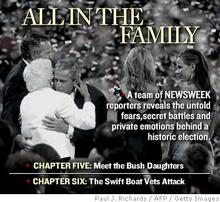I have been reading the very long online Newsweek story about the election, which is apparently the heart of their special election issue. Although navigating through it is a bit of a hassle and the final chapters are not online (unless I’ve missed them), there is some great reporting by a host of Newsweek stalwarts and some first-rate writing by Evan Thomas, who wrote it up.
This is the MSM at its best, which (we need to remember) is awfully good.
Surprisingly, the only weak section is the clunky introduction, which is more speculative and not as strongly written as the rest. Once Evans gets into the details of the campaigns, it is a rolling good read with lots of amusing moments.

NEWSWEEK reports that it got special access on condition of not revealing information until after the election.
To read most of the sections, click on each of these, then continue to the other pages in each chapter:
INTRO
Ch. 1
Ch. 2
Ch. 3
Ch. 4
Ch. 6
As a teaser, here is just one of many stories about Bush or Kerry that I haven’t heard about before:
On Dec. 9 Al Gore showed the political fingertips that lost him the 2000 election. He endorsed Howard Dean, probably at the precise moment when Dean had peaked and was about to head down. Gore’s endorsement came as a blow to Kerry, who had thought Gore was his friend, or at least his political ally. When the Kerry camp heard the rumors that Gore was endorsing Kerry’s opponent, Kerry tried to call the former veep to find out if it could be true. Kerry had Gore’s cell-phone number and called him. “This is John Kerry,” he said when Gore answered. The phone went dead. Kerry tried to call several more times and never got through. He was hurt. “I endorsed him early. I was up for consideration as his running mate,” he complained to an aide.
UPDATE: On balance, Kerry comes off as a very decent (if indecisive) man. There was one passage that dealt with his willingness to see the Iraq War through to conclusion that bears reading:
Former Clinton pollster Stan Greenberg had been pressing Kerry to tie the war to domestic needs—to declare that $200 billion spent on Iraq meant that much less funding for education and health care at home. Kerry used the line in a few speeches, but reluctantly. He didn’t really believe it. In truth, he was willing to spend whatever it took to win in Iraq, or at least to extricate the United States with some semblance of honor.
Still, he was appalled by the carnage in Iraq and the waste of the war. On Sunday night, Sept. 19, the campaign staff met to discuss, one more time, the candidate’s position on Iraq. The Clintonistas pushed a harder line against the war. But the campaign’s old guard wasn’t so sure. Couldn’t Kerry play it both ways? Shrum cautioned against appearing too dovish. Kerry seemed to let the debate go on, circling around and around.
But then he spoke. “It’s gut-check time, folks,” he said. “This is not about whether it’s politically expedient. This is a f—ing war. Kids are dying out there, and this president continues not to tell the truth. You’d have to be out of your mind to go in there the way he did. There was no WMD, no imminent threat, no ties to Al Qaeda. The answer is no. Anything else is crap.”
Kerry had decided to be the antiwar candidate. Not for the first time, to be sure. He had called himself an antiwar candidate when he was trying to peel off the Dean vote in January. But he spoke without any equivocation this time. The next day he gave a blistering speech at NYU, attacking Bush for the folly of invading Iraq.
Comments are closed.